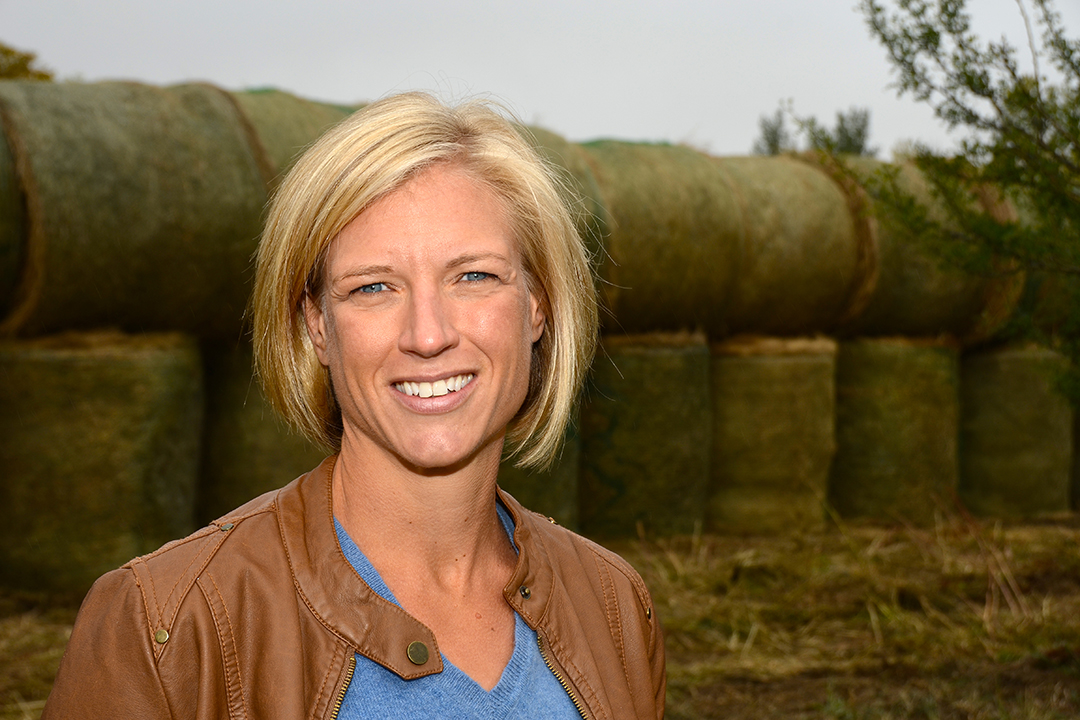
Vet’s work in ag industry powered by education and research
At the first job she ever held as a veterinarian, Dr. Leigh Rosengren remembers her boss telling her that he was going to keep piling things onto her plate until she cried — only then would he take one item off.
By HenryTye GlazebrookIt was a stark introduction to the high-pressure world of veterinary medicine, to be sure, but one which she says she’d already been well prepared to address — thanks to the structured and supportive education she had received at the Western College of Veterinary Medicine (WCVM).
Rosengren graduated from the WCVM in 2001, returning soon after to continue her education through graduate studies.
“I was really pushed to learn everything as independently as I could. There was always support when you hit a wall, but they really encouraged us to do things to the maximum extent of our ability on our own,” says Rosengren. “I think that philosophy of the grad school and the large animal sciences really prepared me to go out into the real world afterwards and tackle problems.”
Her graduate thesis, an examination of antimicrobial resistance in pigs on Saskatchewan and Alberta farms, offers a peek into an expansive mind that’s as enamoured by animals themselves as it is captivated by the epidemiological factors that go into overseeing entire herds at once.
“I was always interested in working with larger populations, but the part of the country that I happened to settle in only had cow-calf [herds],” Rosengren says. “The opportunity to go back and dig deeper in [the] swine industry — there’s a fascination with production systems and the risk management of having so many animals together.”
The decision to return to the U of S for a PhD degree is one that came naturally to Rosengren. She knew from her own experience that the WCVM offered good programming options and the freedom to life a full, adult life outside of school. But more importantly, she trusted that the college’s instructors would continue to give her the first-rate education that she’d come to expect during her Doctor of Veterinary Medicine (DVM) program.
She wasn’t disappointed.
“[Dr.] Cheryl Waldner is an absolute gem at that college,” Rosengren says. “She is a brilliant mind and also the most compassionate and caring supervisor that a person could have asked for. It was a fluke that I ended up working under Cheryl during grad school, because I didn’t know her prior, but it was one of the best experiences that I had.”
Rosengren, who is president of the Western Canadian Association of Swine Veterinarians, looks to the WCVM as a powerful resource in Saskatchewan, in the prairies as a whole and beyond for veterinarians and producers alike.
As a producer herself, she sees the veterinary college as a remarkable stepping stone not just for research and education but also in linking these two areas to the day-to-day agricultural work that provides food to people around the world.
Ultimately, Rosengren points out that WCVM-based research enables producers to have more science-based approaches to the decisions and the changes they need to make.
“I think the college has a role to collaborate with industry right across the board to make sure that the research questions they’re asking are pertinent and that the hard-earned work that they’re doing gets back to into ground-level application — be it through extension of their research, through educating grad students to go out and work in their industry or, probably most importantly, just funneling that new knowledge and those new ideas into their DVM grads,” says Rosengren.
“The graduates coming out of WCVM are a new source of inspiration and knowledge and different ways that we can approach veterinary medicine in Canada.”